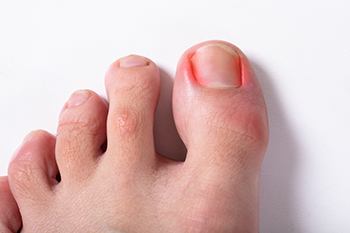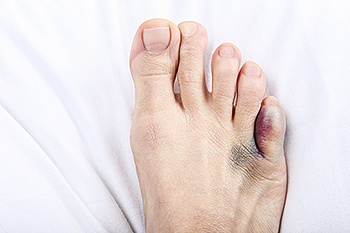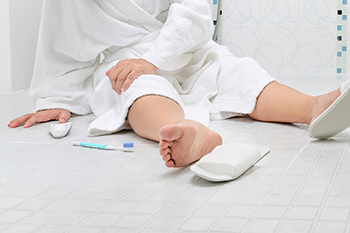Items filtered by date: February 2022
Ingrown Toenails 101
 When the toenail becomes curved and grows into the skin along the sides of the nail, it forms an ingrown toenail. This can result in pain, inflammation, redness, swelling, and in some cases an infection. Issues such as genetics, improperly trimmed toenails, sweaty feet, and shoes that are too tight can all lead to ingrown toenails. In fact, athletes are particularly prone to ingrown toenails because they sweat more often. While ingrown toenails are usually not very serious, if left untreated, they can get very painful and may even get infected. Patients with ingrown toenails who have diabetes or a compromised immune system, have persistent pain, or believe that the nail is infected should consult with a podiatrist for treating the nail.
When the toenail becomes curved and grows into the skin along the sides of the nail, it forms an ingrown toenail. This can result in pain, inflammation, redness, swelling, and in some cases an infection. Issues such as genetics, improperly trimmed toenails, sweaty feet, and shoes that are too tight can all lead to ingrown toenails. In fact, athletes are particularly prone to ingrown toenails because they sweat more often. While ingrown toenails are usually not very serious, if left untreated, they can get very painful and may even get infected. Patients with ingrown toenails who have diabetes or a compromised immune system, have persistent pain, or believe that the nail is infected should consult with a podiatrist for treating the nail.
Ingrown toenails can become painful if they are not treated properly. For more information about ingrown toenails, contact the foot specialists of Podiatry Associates of Belleville. Our doctors can provide the care you need to keep you pain-free and on your feet.
Ingrown Toenails
Ingrown toenails occur when a toenail grows sideways into the bed of the nail, causing pain, swelling, and possibly infection.
Causes
- Bacterial infections
- Improper nail cutting such as cutting it too short or not straight across
- Trauma to the toe, such as stubbing, which causes the nail to grow back irregularly
- Ill-fitting shoes that bunch the toes too close together
- Genetic predisposition
Prevention
Because ingrown toenails are not something found outside of shoe-wearing cultures, going barefoot as often as possible will decrease the likeliness of developing ingrown toenails. Wearing proper fitting shoes and using proper cutting techniques will also help decrease your risk of developing ingrown toenails.
Treatment
Ingrown toenails are a very treatable foot condition. In minor cases, soaking the affected area in salt or antibacterial soaps will not only help with the ingrown nail itself, but also help prevent any infections from occurring. In more severe cases, surgery is an option. In either case, speaking to your podiatrist about this condition will help you get a better understanding of specific treatment options that are right for you.
If you have any questions please feel free to contact our office located in Belleville, NJ . We offer the newest diagnostic and treatment technologies for all your foot and ankle needs.
Foot Drop May Increase Your Risk of Falling
If you or someone you love is having difficulty walking up stairs, struggles with balance, or is prone to tripping or falling, they may have a condition known as foot drop. This condition makes it difficult for a person to lift the front part of the foot, and may also cause numbness, weakness, and limpness in the foot. Foot drop may also trigger a change in how a person walks, in order to counteract these impediments. Foot drop most typically occurs when the peroneal nerve (which controls the muscles that lift the foot) becomes damaged due to compression, injury, or disease. It may also be due to a muscular or anatomical issue. This condition may be temporary or permanent, with possible treatments including orthosis, orthotics, physical therapy, nerve stimulation, or even surgery if necessary. Because the symptoms of foot drop can raise a person’s risk of falling and/or tripping, a podiatrist should be consulted as soon as possible to explore all treatment options.
Preventing falls among the elderly is very important. If you are older and have fallen or fear that you are prone to falling, consult with the foot specialists from Podiatry Associates of Belleville. Our doctors will assess your condition and provide you with quality advice and care.
Every 11 seconds, an elderly American is being treated in an emergency room for a fall related injury. Falls are the leading cause of head and hip injuries for those 65 and older. Due to decreases in strength, balance, senses, and lack of awareness, elderly persons are very susceptible to falling. Thankfully, there are a number of things older persons can do to prevent falls.
How to Prevent Falls
Some effective methods that older persons can do to prevent falls include:
- Enrolling in strength and balance exercise program to increase balance and strength
- Periodically having your sight and hearing checked
- Discuss any medications you have with a doctor to see if it increases the risk of falling
- Clearing the house of falling hazards and installing devices like grab bars and railings
- Utilizing a walker or cane
- Wearing shoes that provide good support and cushioning
- Talking to family members about falling and increasing awareness
Falling can be a traumatic and embarrassing experience for elderly persons; this can make them less willing to leave the house, and less willing to talk to someone about their fears of falling. Doing such things, however, will increase the likelihood of tripping or losing one’s balance. Knowing the causes of falling and how to prevent them is the best way to mitigate the risk of serious injury.
If you have any questions, please feel free to contact our office located in Belleville, NJ . We offer the newest diagnostic and treatment technologies for all your foot care needs.
How the Feet Can Reveal Issues Throughout the Body
 There are a variety of health issues that can occur throughout the body that podiatrists are often the first to discover. This is because foot related issues can be an indicator of a more severe issue. For example, if your feet are too cold or turning blue, it can mean that there are issues with how the blood is circulating throughout the body. Diabetes is another condition that can affect the feet by causing wounds to heal slower. Heart disease or high blood pressure is another issue that can present itself in the feet by causing the feet to swell. Frequently occurring fungal nail infections can also indicate an auto-immune disorder or a weakened immune system. Patients who notice anything unusual with their feet should visit with a podiatrist to have the issue examined.
There are a variety of health issues that can occur throughout the body that podiatrists are often the first to discover. This is because foot related issues can be an indicator of a more severe issue. For example, if your feet are too cold or turning blue, it can mean that there are issues with how the blood is circulating throughout the body. Diabetes is another condition that can affect the feet by causing wounds to heal slower. Heart disease or high blood pressure is another issue that can present itself in the feet by causing the feet to swell. Frequently occurring fungal nail infections can also indicate an auto-immune disorder or a weakened immune system. Patients who notice anything unusual with their feet should visit with a podiatrist to have the issue examined.
When dealing with systemic disease of the feet, it is extremely important to check the affected areas routinely so that any additional problems are caught quickly. If you have any concerns about your feet and ankles contact the foot specialists from Podiatry Associates of Belleville. Our doctors will assist you with all of your podiatric needs.
Systemic Diseases of the Feet
Systemic diseases affect the whole body, and symptoms usually are displayed in the feet. This condition can make a patient’s ability to walk unbearable. Systemic diseases include gout, diabetes mellitus, neurological disorders, and arthritis.
Gout – is caused by an excess of uric acid in the body. Common symptoms include pain, inflammation, and redness at the metatarsal/phalangeal joint of the base big toe. Gout can be treated by NSAIDs to relieve pain and inflammation, and other drugs that lower the acid levels in the body.
Diabetes mellitus – is an increase in the level of blood sugar that the body cannot counteract with its own insulin. Failure to produce enough insulin is a factor in Diabetes.
Diabetes of the Feet
Diabetic Neuropathy – may lead to damaged nerves and affect the feet through numbness and loss of sensation.
Peripheral Vascular Disease – can restrict the blood flow to the feet, and often times lead to amputation of the feet.
If you have any questions please feel free to contact our office located in Belleville, NJ . We offer the newest diagnostic and treatment technologies for all your foot and ankle needs.
Heel Pain Can Be Treated!
Types of Pain in the Toes
 Of the painful conditions that can affect the feet, many of them can affect the toes. For example, ingrown toenails, which occur when the nail curls into the skin, can cause pain and swelling around the base of the toenails. Bunions are another painful condition that form bony lumps at the base of the big toe, often as a result of wearing shoes that are too tight. Pain, swelling and bruising will also be present with any broken toes, and walking will be difficult. Gout, which occurs when crystals build up in the toes due to high purines in the blood, can cause pain and stiffness around the joints of the toe. Patients who have pain in their toes that is severe, worsening, or leads to a loss of sensation would be wise to consult with a podiatrist for a proper diagnosis and treatment option.
Of the painful conditions that can affect the feet, many of them can affect the toes. For example, ingrown toenails, which occur when the nail curls into the skin, can cause pain and swelling around the base of the toenails. Bunions are another painful condition that form bony lumps at the base of the big toe, often as a result of wearing shoes that are too tight. Pain, swelling and bruising will also be present with any broken toes, and walking will be difficult. Gout, which occurs when crystals build up in the toes due to high purines in the blood, can cause pain and stiffness around the joints of the toe. Patients who have pain in their toes that is severe, worsening, or leads to a loss of sensation would be wise to consult with a podiatrist for a proper diagnosis and treatment option.
Foot Pain
Foot pain can be extremely painful and debilitating. If you have a foot pain, consult with the foot specialists from Podiatry Associates of Belleville. Our doctors will assess your condition and provide you with quality foot and ankle treatment.
Causes
Foot pain is a very broad condition that could be caused by one or more ailments. The most common include:
- Bunions
- Hammertoes
- Plantar Fasciitis
- Bone Spurs
- Corns
- Tarsal Tunnel Syndrome
- Ingrown Toenails
- Arthritis (such as Gout, Rheumatoid, and Osteoarthritis)
- Flat Feet
- Injury (from stress fractures, broken toe, foot, ankle, Achilles tendon ruptures, and sprains)
- And more
Diagnosis
To figure out the cause of foot pain, podiatrists utilize several different methods. This can range from simple visual inspections and sensation tests to X-rays and MRI scans. Prior medical history, family medical history, and any recent physical traumatic events will all be taken into consideration for a proper diagnosis.
Treatment
Treatment depends upon the cause of the foot pain. Whether it is resting, staying off the foot, or having surgery; podiatrists have a number of treatment options available for foot pain.
If you have any questions, please feel free to contact our office located in Belleville, NJ . We offer the newest diagnostic and treatment technologies for all your foot care needs.

